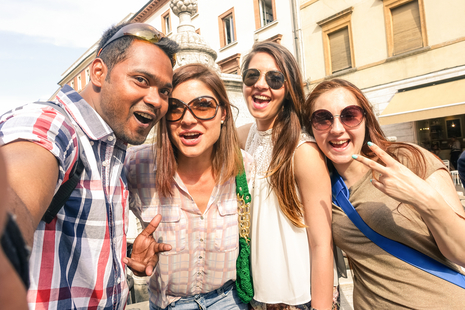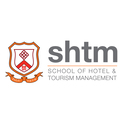

With globalisation and the rise of digital technology, "keeping up with the Joneses" is becoming harder than ever before. In a recently published study, MSc graduate Ms Lauren Siegel and Dr Dan Wang of the School of Hotel and Tourism Management (SHTM) at The Hong Kong Polytechnic University show that for the Internet-savvy Generation Y, travel experiences shared online have replaced material goods as a form of social currency. New approaches to destination marketing are needed if tourism is to realise its potential in the information age. One might say that envy is at the heart of consumer culture. For centuries, the researchers tell us, people of all ages and generations have sought to "keep up" socially by doing and buying the same things as their peers. Of course, their ability to do so depends on the visibility of other people's lives, and the last two centuries have seen a paradigm shift in the way that alternative lifestyles are marketed to us. The researchers point out that from printed mail order catalogues to the beaming of television commercials into homes across the globe, every new iteration of mass marketing in the 20th century redefined consumption preferences and further expanded the consumer economy. People began to engage in conspicuous consumption - spending lavishly on luxury goods as a public display of status and power - and used such visible, tangible markers to assess their own worth in comparison with their peers. In recent decades, these social trends have accelerated with the explosion of digital marketing and the near-ubiquity of the Internet. Today's digital world, the researchers argue, offers an "unprecedented amount of opportunities for individuals to quickly and frequently compare themselves to their peers". Indeed, they point out that "many millennials are never without their mobile devices, and live in a state of constant peer comparison". At the same time, however, new kinds of consumption have emerged. For millennials, the researchers note, experiences have replaced physical possessions as markers of status, and in an increasingly globalised world, travelling is considered one of the most meaningful types of experience. Whereas a suburban young couple of the 1950s might have bought a swimming pool for their neighbours to envy, millennials today are "keeping up with the Joneses" through a camera lens, sharing photographs of themselves in Phuket or Florida on their Instagram accounts. At this intersection of emerging social trends, the researchers have unearthed a fascinating yet under-researched area for exploration. How has travel emerged as a means of social comparison, and how do millennials' social networking habits influence their travel behaviours - and vice versa? Social comparison has rarely been explored using travel as an indicator of status, and despite abundant research on Generation Y, we know little about how pressure to "keep up" with their peers on social media influences millennials' travel decisions. To answer these questions, and ultimately to help travel and tourism marketers more accurately target this enormously influential cohort, the researchers set out to directly examine the "embodied experiences" of millennials who actively post travel-related photographs and other content on social networking sites (SNS). The researchers recruited 32 millennials (aged between 21 and 33) via Facebook, one of the most widely used SNS worldwide, and conducted three phases of analysis to explore their activities as tourists on social media. As the respondents routinely reviewed and posted content related to their travel experiences online, the researchers could be certain of extracting the most pertinent and up-to-date information available. In the first phase of the analysis, they asked the informants some open-ended questions about their travels in the last three years, and how they felt when they saw their friends' posts about far-flung "exotic" destinations. The second phase saw the original sample split into two sub-groups to explore the potential correlations between travel behaviours. Finally, the researchers conducted 10 face-to-face interviews to delve deeper into the respondents' motivation to "keep up" with their peers' travel experiences on social media. The young people who took part in the research came from similar economic and sociological backgrounds, because individuals tend to compare themselves only with peers whom they perceive as similar. They all had enough disposable income to travel frequently for fun. Most (77 per cent) were female, as women are typically more active on SNS than men, and they came from a range of countries worldwide - predominantly the United States, but also China, Indonesia, Germany and others. At first sight, the millennials' responses to the survey seemed rather different. Although many "loved" reading about others' holidays online, others felt jealous and some were even annoyed by the profusion of travel-related posts. Whereas some hoped simply to "promote" and "share the beauty" of the places they visited, others admitted that they shared photographs of their travels online to show off and "make everyone jealous". When the researchers took a closer look, however, they discovered overwhelming similarities within the peer groups. All of the millennials were familiar with the travel history of their SNS connections, and all preferred to spend their money on experiences than on material possessions, reflecting their shared sense of the "visibility of travel as a commodity". Unsurprisingly, therefore, the photo- and video-based SNS Instagram was far ahead of Twitter and even Facebook as the preferred tool for sharing travel experiences. To stay ahead of the curve in enticing this "acutely visual generation", the researchers suggest, destination marketers - from governments to tourism companies - must provide ample opportunities for online image sharing as a tool for peer visibility. At the very least, online photographic advertising must be of a sufficiently high quality to cater to the sophisticated millennial "palate" for picture editing, filters and lighting. "We're bombarded with way more images than our parents were, for sure," said one informant. The more visible a destination, the more likely it is to elicit envy. Indeed, the second and third phases of the analysis revealed that the millennials felt a subconscious need to "keep up" by visiting the same destinations as their peers. Although "deals and time constraints certainly drive decision making", note the researchers, "social influence and peer comparison are also major driving forces". As travel experiences seem to be a marker of status for many millennials, the researchers recommend that travel companies and destination marketers also focus on socialisation strategies to meet the needs of this hugely powerful new cohort of travellers. "No longer willing to be passive consumers, this generation wants to actively participate, co-create, and most importantly, be included as partners in the brands they choose". As a thought-provoking concluding remark, the researchers speculate that with a better understanding of their motivations for travel, millennial travellers themselves may wish to "re-evaluate their intentions and choose more sustainable, mindful and purposeful travel behaviors". Indeed, the findings may help travellers of any age and generation to better manage their travel expectations, knowing that many people post merely "a façade of their journeys, which may not represent their true experience". Overall, the researchers provide important clues to the social motivations of millennial travellers and recommendations for tailoring marketing to the travel habits of future generations. This will be particularly important for developing regions that have recently seen a boom in international tourism, such as China. However, the researchers do offer a warning. "While social comparison remains constant, the social networking idiosyncrasies of Generation Y will inevitably undergo a metamorphosis due to the ever-changing nature of technology and social networking", they remark. Ongoing study will be needed to ensure that the evolving needs of this and future cohorts continue to be met. Lauren A. Siegel and Dan Wang. (2019). Keeping Up with the Joneses: Emergence of Travel as a Form of Social Comparison among Millennials. Journal of Travel & Tourism Marketing, 36(2), 159-175. For more than four decades, the School of Hotel and Tourism Management (SHTM) of The Hong Kong Polytechnic University has refined a distinctive vision of hospitality and tourism education and become a world-leading hotel and tourism school. Ranked No. 1 in the world in the "Hospitality and Tourism Management" category in ShanghaiRanking's Global Ranking of Academic Subjects 2024 for the eighth consecutive year; placed No. 1 globally in the "Commerce, Management, Tourism and Services" category in the University Ranking by Academic Performance in 2023/2024 for seven years in a row; rated No. 1 in the world in the "Hospitality, Leisure, Sport & Tourism" subject area by the CWUR Rankings by Subject 2017; and ranked No. 1 in Asia in the "Hospitality and Leisure Management" subject area in the QS World University Rankings by Subject 2025, the SHTM is a symbol of excellence in the field, exemplifying its motto of Leading Hospitality and Tourism. The School is driven by the need to serve its industry and academic communities through the advancement of education and dissemination of knowledge. With a strong international team of over 90 faculty members from 21 countries and regions around the world, the SHTM offers programmes at levels ranging from undergraduate to doctoral degrees. Through Hotel ICON, the School's groundbreaking teaching and research hotel and a vital aspect of its paradigm-shifting approach to hospitality and tourism education, the SHTM is advancing teaching, learning and research, and inspiring a new generation of passionate, pioneering professionals to take their positions as leaders in the hospitality and tourism industry. Website: https://www.polyu.edu.hk/shtm/.
Organization
School of Hotel and Tourism Management (SHTM) at The Hong Kong Polytechnic University
www.polyu.edu.hk/htm/
17 Science Museum Road
Tsim Sha Tsui East, Kowloon
Hong Kong (SAR)
Phone: +852-3400-2200
Fax: +852-2362-9362
Email: hminfo@polyu.edu.hk
Recent News
 When Hospitality Goes Overboard When Hospitality Goes Overboard |
 Impulse and Indulgence: The Psychology of Unplanned Luxury Consumption Impulse and Indulgence: The Psychology of Unplanned Luxury Consumption |
 Luxury Hotel Experiences Luxury Hotel Experiences |